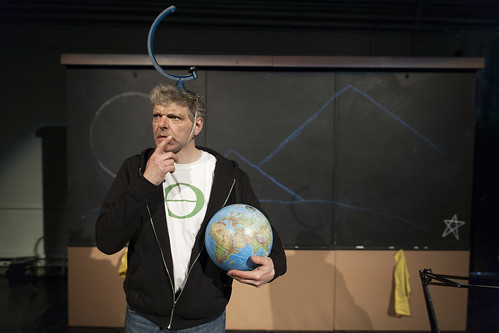Review – One Giant Leap
✭✭✩✩✩ Complex and patronising
Summerhall (Venue 26)
Fri 2 – Sun 25 August 2013
Review by Mark Bolsover
There’s an energetic – though somewhat wide-of-the-mark – performance by Iain Johnstone in in this brief history of humanity’s relationship to space from Wee Stories.
The interesting but over-complex jaunt, which is part-lecture, part-performance, may be lost on those at the lower end of its over-tens target audience.
Johnstone plays the part of your common-or-garden Scottish dad, triggered into an eccentric review of intellectual history by his son’s school project on the solar system. The device is a nice one and works well in initially engaging the shows young audience, but the humour is slightly flat and hit-and-miss.
One Giant Leap’s strength is its setting in Summerhall’s frankly gorgeous Demonstration Room lecture hall, and its very clever use of video and image projection, recorded voice-over, set and props. The chalkboard, to all appearances an original part of the lecture theatre, proves to be a dynamic set in itself and switches beautifully between ordinary chalkboard and interactive projection screen. The props are colourful and effective visual aids, used to illustrate distances and volumes.
From his son’s school project, Johnstone leaps back to a reminiscence of his childhood impressions of the moon landing, to his survey of ancient to modern history, arriving, via the moon landing back at his son’s project.
The historical sweep here is broad: beginning with ‘primitive man’s’ (an unfortunate choice of phrasing) relationship to the heavens, through an extremely interesting account of the formation of time, ancient Greek and Roman thought, the ‘Dark Ages’ and Renaissance, to modern science.
The scope of the historical survey means that Johnstone must necessarily make somewhat reductive statements. However, the script here maintains some quite awkward clichés about, for example, ancient Greek thought’s conception of the shape of the earth and the role of the church in the ‘Dark Ages’ (including the retention of that term).
Johnstone’s dismissal of a racially-biased view of history is interesting as he gives a good post-colonial spin to his account of the origins of the Renaissance, for example. However, his berating of the medieval church for maintaining the populace of northern Europe in poverty and ignorance for its own ends – and allowing access to education and culture only to a wealthy elite – comes across as a quite crude over-simplification.
This rejection of a religious world-view as ‘false orthodox’ runs through the show. A rejection which is made all the more ironic when, in his obviously passionate and otherwise compelling eco-critical conclusion from the vantage point of the astronauts on the moon looking back at Earth, Johnstone claims that the Earth had been “a Garden of Eden all along and we didn’t even know it…”.
Though One Giant Leap is entertaining and makes great use of its set and props it is apparent that younger members of the audience struggle to understand and to keep up with its accumulation of facts and figures. There is something just a little too patronising in Johnstone’s delivery. With work on the performance and, more importantly, on the simplification of its script, One Giant Leap has the potential to be a good show and learning resource.
Running time 1hr, 10mins
Run ends Sunday 25 August, 2013
Daily, 10.15am
Venue 26, Summerhall, 1 Summerhall, Edinburgh, EH9 1QH
Tickets from: www.edfringe.com
Wee Stories website: www.weestoriestheatre.org
ENDS



















